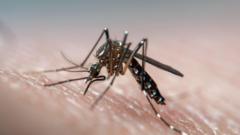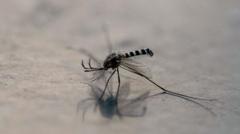Scientists at the University of California have introduced a novel method to combat dengue and related diseases by genetically altering male mosquitoes to render them deaf, effectively hindering their ability to mate and produce offspring. The implications of this research could significantly impact the population of disease-carrying mosquitoes.
Innovative Approach to Combat Dengue: Creating Deaf Mosquitoes

Innovative Approach to Combat Dengue: Creating Deaf Mosquitoes
Researchers develop a method to mitigate dengue and other mosquito-borne diseases by making male mosquitoes deaf, disrupting their mating capabilities.
In a groundbreaking study, scientists have discovered a unique approach to combat mosquito-borne diseases like dengue, Zika, and yellow fever by rendering male mosquitoes deaf, thereby impairing their mating success. The research, conducted by teams at the University of California, Irvine, and University of California, Santa Barbara, focused on the common Aedes aegypti species, which is responsible for infecting approximately 400 million people each year.
Male mosquitoes typically rely on their ability to detect female wingbeats — essentially the sound produced while flying — as a means to locate potential mates. To disrupt this process, researchers manipulated a genetic pathway related to sound detection in male mosquitoes by targeting a protein known as trpVa, which plays a crucial role in their hearing ability. As a result, the altered males showed no response to the mating signals emitted by females, failing to mate altogether even when in close proximity for up to three days.
The findings were particularly striking when compared to wild male mosquitoes, which engaged in copulation multiple times and managed to fertilize nearly all the females present. The study, published in the Proceedings of the National Academy of Sciences (PNAS), reveals that the deaf males exhibited an absolute elimination of mating behavior due to their genetic modification.
Expert Dr. Joerg Albert from the University of Oldenburg commended the study for demonstrating the importance of auditory cues in mosquito reproduction. He noted that while attacking the sense of sound is a promising strategy for controlling mosquito populations, further research and sensible management of this approach are needed to ensure ecological balance. The implications of this study raise questions about the viability of male mosquitoes — without their hearing abilities, the risk of extinction looms, highlighting the delicate interplay between species conservation and public health.
Moreover, experts also consider alternative strategies, such as introducing sterile males into areas where mosquito-borne diseases are prevalent. However, it is essential to balance these tactics with the ecological roles mosquitoes play, including their contribution to the food chain and their function as pollinators — underscoring the complexity of addressing mosquito-related health issues without inadvertently harming the environment.





